An assessment of the 2011-2015 Republic of Armenia Gender Policy Strategic Action Plan and the 2011-2015 Strategic Action Plan to Combat Gender-Based Violence found that both set goals that were too ambitious and unattainable given the institutional capacity; not only was there no dedicated funding to carry out the initiatives set forth in the action plans, there were also no given measurable indicators, precise timeframes, nor any delineation of the departments responsible for implementing activities, rendering it ineffective.
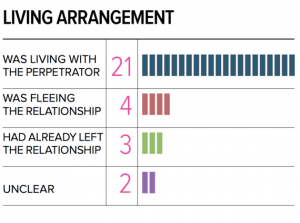 The lack of institutional capacity to address DV continues to be a considerable barrier for women seeking safety and protection. In 2015, there were 784 official complaints of domestic abuse to the police and over 2,000 hotline calls to the Coalition to Stop Violence Against Women alone. Given that speaking out about DV is taboo in Armenian society, it is likely that many more victims hide behind the shroud of stigma and shame or lack the ability to seek help. Specialized service providers working in the field, including social workers and medical personnel, are not trained on DV service provision, and often death threats and other warning signs are overlooked. Thus, many victims turn to the police and the criminal justice system for safety, assistance, and justice but discover that these systems fail to protect them — or worse, re-victimize them.
The lack of institutional capacity to address DV continues to be a considerable barrier for women seeking safety and protection. In 2015, there were 784 official complaints of domestic abuse to the police and over 2,000 hotline calls to the Coalition to Stop Violence Against Women alone. Given that speaking out about DV is taboo in Armenian society, it is likely that many more victims hide behind the shroud of stigma and shame or lack the ability to seek help. Specialized service providers working in the field, including social workers and medical personnel, are not trained on DV service provision, and often death threats and other warning signs are overlooked. Thus, many victims turn to the police and the criminal justice system for safety, assistance, and justice but discover that these systems fail to protect them — or worse, re-victimize them.
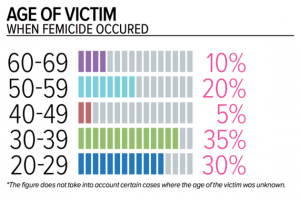 A handful of NGOs, including the Women’s Support Center, have worked to raise awareness on domestic violence, establish services for victims, and introduce legislation. As a result of our advocacy efforts, there is growing awareness among Armenian society about domestic violence and more women every day reaching out for support. Chronically underfunded and under-resourced, NGOs have taken on the full burden of offering services to survivors and their children, including shelter assistance. A domestic violence bill drafted by NGOs was rejected twice in 2009 and 2013. Because of top-down pressure and financial support from the EU, which made its 11 million euros in aid contingent on Armenia passing legislation, a domestic violence law is set to be passed by 2018, though concerns remain about whether it will offer the proper safeguards to victims. The draft law was recently taken out of circulation, and public hearings concerning the law have been pushed back.
A handful of NGOs, including the Women’s Support Center, have worked to raise awareness on domestic violence, establish services for victims, and introduce legislation. As a result of our advocacy efforts, there is growing awareness among Armenian society about domestic violence and more women every day reaching out for support. Chronically underfunded and under-resourced, NGOs have taken on the full burden of offering services to survivors and their children, including shelter assistance. A domestic violence bill drafted by NGOs was rejected twice in 2009 and 2013. Because of top-down pressure and financial support from the EU, which made its 11 million euros in aid contingent on Armenia passing legislation, a domestic violence law is set to be passed by 2018, though concerns remain about whether it will offer the proper safeguards to victims. The draft law was recently taken out of circulation, and public hearings concerning the law have been pushed back.
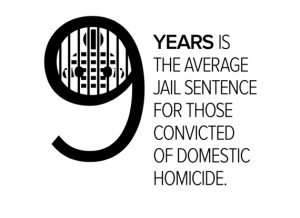 Further reinforcing the aforementioned institutional problems is gender stereotyping, which trickles down from the state to the public and fosters discriminatory approaches toward women. Deep-rooted beliefs about traditional family values drive gender stereotypes and enforce the notion that men should be dominant and women subservient and submissive. Justifications for violence are frequently based on cultural and social norms that socialize males to be aggressive, powerful, unemotional, and controlling and women to be passive, nurturing, submissive, emotional, powerless, and dependent on men. This unequal power relationship between men and women is reinforced by a number of factors, including the Armenian schooling system and mass media. School textbooks encourage young girls and boys to keep to their traditional gender roles, in effect normalizing and perpetuating gender stereotypes. Widely viewed Armenian soap operas depict women as beaten and cheated upon, reinforcing the cultural acceptance of gender-based violence. When played out in real life, these gender roles take on a sinister tone in situations of abuse, translating into a learned behavior whereby few women leave abusive husbands and perpetrators believe that their actions are not out of line. This common acceptance of domestic abuse hinders women’s ability to live in safety and perpetuates the cycle of violence.
Further reinforcing the aforementioned institutional problems is gender stereotyping, which trickles down from the state to the public and fosters discriminatory approaches toward women. Deep-rooted beliefs about traditional family values drive gender stereotypes and enforce the notion that men should be dominant and women subservient and submissive. Justifications for violence are frequently based on cultural and social norms that socialize males to be aggressive, powerful, unemotional, and controlling and women to be passive, nurturing, submissive, emotional, powerless, and dependent on men. This unequal power relationship between men and women is reinforced by a number of factors, including the Armenian schooling system and mass media. School textbooks encourage young girls and boys to keep to their traditional gender roles, in effect normalizing and perpetuating gender stereotypes. Widely viewed Armenian soap operas depict women as beaten and cheated upon, reinforcing the cultural acceptance of gender-based violence. When played out in real life, these gender roles take on a sinister tone in situations of abuse, translating into a learned behavior whereby few women leave abusive husbands and perpetrators believe that their actions are not out of line. This common acceptance of domestic abuse hinders women’s ability to live in safety and perpetuates the cycle of violence.
Taguhi Mansuryan’s case, which sent shockwaves through the community, is emblematic of systemic problems at all levels. Reflecting the gender insensitivity that pervades the criminal justice system, Vladik Martirosyan was tried for assaulting Mansuryan prior to the murder and attempted murders and let off on an extremely light sentence. The media response appeared to make the situation worse. The perpetrator was invited to appear on the talk show Half-Opened Windows (Kisabac Lusamutner), where he was portrayed as a victim whose parental rights were taken away. Moreover, despite the fact that Mansuryan was threatened over a long period of time and violently attacked outside of her home, neighbors allegedly failed to intervene or call for help, which is indicative of the societal indifference victims of domestic violence face.
The Women’s Support Center attended the last trial that took place on April 10, 2017 at the Shengavit First Instance Court with presiding judge David Balayan. We share the ongoing concerns we have about the case below:
● The victim spoke at length, with little direction from her lawyers. A system by which the prosecuting attorney asks very direct questions and the victim/witness is encouraged to answer only the question and not offer any additional information would help introduce the most pertinent information and reduce the chance of the victim contradicting previous statements.
● The judge gave the defendant an opportunity to question the witness directly. Although this is common practice under Armenian law, we found it to be highly inappropriate and insensitive given her history as a victim of violence. Having a trained professional ask the questions not only uses the court’s time more efficiently, but it also eliminates the risk of intimidating or further traumatizing a victim/witness. In this case, where the victim is alleging that the defendant caused her grave harm and has a history of violent behavior, it was particularly shocking that the defendant was allowed to speak directly to the victim.
● The judge’s tone was often harsh and impatient with the victim. When comparing the victim’s prior written statements to what she said in court, the judge chose to focus on some minor details. The most aggravating was the judge’s insistence that she could not have known whether the axe the perpetrator attacked her with was new or old. He even went so far as to hold up his pen and ask the victim if she could tell if the pen appeared to be worn out or not. He seemed to latch on to minor discrepancies in order to discredit her as a witness.
● Another issue that was discussed at length was that of child visitation. The defendant questioned the victim about not following through with the visitation schedule and keeping their child away from him. The victim’s attorney tried to question the relevance of this, but the judge allowed the questioning to continue and even returned to the issue himself. At least 20 minutes were spent debating the dates that the victim was supposed to bring the child to see his father and failed to do so. Allowing this questioning to take place inadvertently justifies the defendant’s action, whether that was the intention or not.
● Under these circumstances, it was incredible that Mansuryan was able to maintain her strength and composure. She stood at the witness stand for over 2 hours, responding calmly to questions from the judge, her lawyers, the defense, and the defendant. She fought back tears only a couple times while describing the incident and remained respectful through some rather aggravating questions/discussions.
● Perhaps it will be addressed in a different part of the trial, but there was no mention of the victim’s mother, who was killed during the incident. This is the main reason the trial is being held, so it seems odd that this was not brought up at the first hearing.
● It is common practice in Armenia to allow criminal trials involving domestic violence and femicide to be stretched out for a year or longer, and this case will likely not be an exception. Given that it involves a murder and attempted murder, we feel that it should be a priority to reach a resolution in a timely and urgent manner.
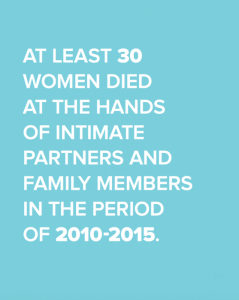 Domestic violence is a multi-dimensional problem that requires integrated and coordinated responses at all levels. Armenia desperately needs a well-functioning referral mechanism among law enforcement, civil society, health care providers, child protection services, educators, the media, and other actors. While the Armenian legal system differs from the US context, there are certain ethical considerations that should be universal, such as the right to a fair trial and judicial impartiality. There were clear ethical violations at the aforementioned trial. Judge Balayan demonstrated gender insensitivity and, at times, belittled the victim.
Domestic violence is a multi-dimensional problem that requires integrated and coordinated responses at all levels. Armenia desperately needs a well-functioning referral mechanism among law enforcement, civil society, health care providers, child protection services, educators, the media, and other actors. While the Armenian legal system differs from the US context, there are certain ethical considerations that should be universal, such as the right to a fair trial and judicial impartiality. There were clear ethical violations at the aforementioned trial. Judge Balayan demonstrated gender insensitivity and, at times, belittled the victim.
As the issue of domestic violence in Armenia is steeped in a strong patriarchal tradition and stems from harmful gender stereotypes and a cultural acceptance of gender-based violence, a greater emphasis on primary prevention is vital for a paradigm shift to occur. The government must be kept accountable for fulfilling their commitment to combat DV. We urge the State to comply with its international obligations by adopting a standalone DV law; carrying out comprehensive trainings with specialized service providers, including law enforcement officials; supporting DV shelters; and carrying out public campaigns, advocacy, and educational initiatives. Only when victims are properly assisted and perpetrators punished will the public receive the clear message that domestic abuse is a serious crime that cannot and should not be tolerated. We cannot wait by the sidelines as more women in Armenia are beaten, tortured, and murdered. We must act now.
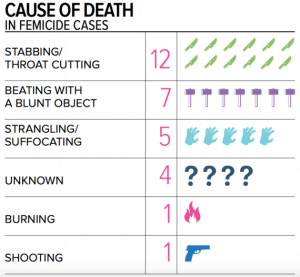 Despite certain measures that have been taken by the state to combat DV, Armenia is falling short of its international obligations, including those under the Convention to Elimination All Forms of Discrimination Against Women (CEDAW). There has been little political will demonstrated at the highest policy-making level and few financial resources allocated for combating DV. At present, Armenia does not have a standalone law on DV that would call special attention and treatment of such crimes. The RA Criminal Code only criminalizes assault, failing to expressly recognize domestic violence as criminal conduct. The existing criminal and administrative laws that prohibit intentional injury do not work in favor of victims, and they often withdraw their complaints when the abuser may be punished with a monetary fine that comes out of the family budget or imprisoned and unable to financially support the family.
Despite certain measures that have been taken by the state to combat DV, Armenia is falling short of its international obligations, including those under the Convention to Elimination All Forms of Discrimination Against Women (CEDAW). There has been little political will demonstrated at the highest policy-making level and few financial resources allocated for combating DV. At present, Armenia does not have a standalone law on DV that would call special attention and treatment of such crimes. The RA Criminal Code only criminalizes assault, failing to expressly recognize domestic violence as criminal conduct. The existing criminal and administrative laws that prohibit intentional injury do not work in favor of victims, and they often withdraw their complaints when the abuser may be punished with a monetary fine that comes out of the family budget or imprisoned and unable to financially support the family. The lack of institutional capacity to address DV continues to be a considerable barrier for women seeking safety and protection. In 2015, there were 784 official complaints of domestic abuse to the police and over 2,000 hotline
The lack of institutional capacity to address DV continues to be a considerable barrier for women seeking safety and protection. In 2015, there were 784 official complaints of domestic abuse to the police and over 2,000 hotline  A handful of NGOs, including the
A handful of NGOs, including the  Further reinforcing the aforementioned institutional problems is gender stereotyping, which trickles down from the state to the public and fosters discriminatory approaches toward women. Deep-rooted beliefs about traditional family values drive gender stereotypes and enforce the notion that men should be dominant and women subservient and submissive. Justifications for violence are frequently based on cultural and social norms that socialize males to be aggressive, powerful, unemotional, and controlling and women to be passive, nurturing, submissive, emotional, powerless, and dependent on men. This unequal power relationship between men and women is reinforced by a number of factors, including the Armenian schooling system and mass media. School
Further reinforcing the aforementioned institutional problems is gender stereotyping, which trickles down from the state to the public and fosters discriminatory approaches toward women. Deep-rooted beliefs about traditional family values drive gender stereotypes and enforce the notion that men should be dominant and women subservient and submissive. Justifications for violence are frequently based on cultural and social norms that socialize males to be aggressive, powerful, unemotional, and controlling and women to be passive, nurturing, submissive, emotional, powerless, and dependent on men. This unequal power relationship between men and women is reinforced by a number of factors, including the Armenian schooling system and mass media. School  Domestic violence is a multi-dimensional problem that requires integrated and coordinated responses at all levels. Armenia desperately needs a well-functioning referral mechanism among law enforcement, civil society, health care providers, child protection services, educators, the media, and other actors. While the Armenian legal system differs from the US context, there are certain ethical considerations that should be universal, such as the right to a fair trial and judicial impartiality. There were clear ethical violations at the aforementioned trial. Judge Balayan demonstrated gender insensitivity and, at times, belittled the victim.
Domestic violence is a multi-dimensional problem that requires integrated and coordinated responses at all levels. Armenia desperately needs a well-functioning referral mechanism among law enforcement, civil society, health care providers, child protection services, educators, the media, and other actors. While the Armenian legal system differs from the US context, there are certain ethical considerations that should be universal, such as the right to a fair trial and judicial impartiality. There were clear ethical violations at the aforementioned trial. Judge Balayan demonstrated gender insensitivity and, at times, belittled the victim.